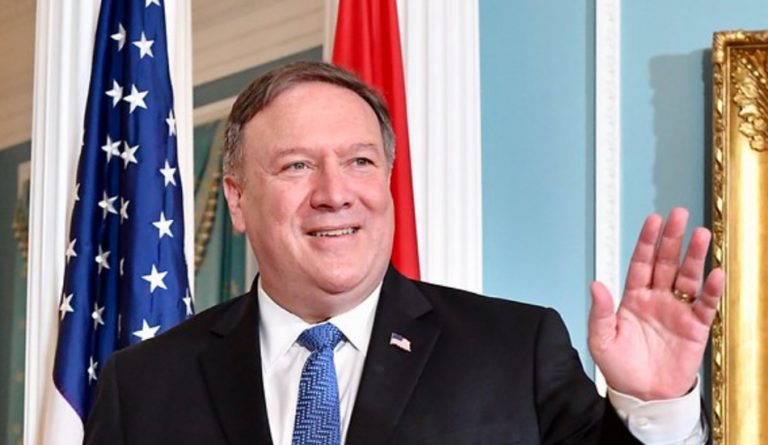The state-run China Central Television (CCTV) on Nov. 15 delivered an extraordinary barrage of insults and obscenities directed at U.S. Secretary of State Mike Pompeo.
Pompeo, who is currently on a tour in Europe, has sent strong signals that he will continue to sanction human rights violators, especially officials from the People’s Republic of China. He and other Trump administration officials have repeatedly condemned the Chinese Communist Party (CCP) for its persecution of political dissent and religious faith.
The State Department has also pressed Beijing on hot-button topics, such as the diplomatic status of Taiwan, and has called the Communist Party’s very political legitimacy into question.
The Party considers democratic Taiwan — which is officially called the Republic of China — part of the PRC’s territory. Beijing vows to “recover” the island with military force if necessary.
In a Nov. 12 interview, Pompeo said that “Taiwan has not been a part of China, and that was recognized with the work that the Reagan administration did to lay out the policies that the United States has adhered to now for three-and-a-half decades, and done so under both administrations.”

Success
You are now signed up for our newsletter
Success
Check your email to complete sign up
Four days later, on Sunday, CCTV suddenly insulted Pompeo with outlandishly sharp words, saying he was a “scumbag” and a “sh*t-stirrer”, that he was “like a rogue gambler who gambled his eyes out” and “had an iron heart after swallowing a steelyard”.
The overseas edition of the People’s Daily went so far as to publish an op-ed that uses a series of four-character words to scold Pompeo for being what it called “apocalyptically insane,” “arrogant and ignorant,” “having sinister motives,” “misleading public opinion,” “manipulating public perception,” and “being extremely calculating.”
Pompeo, who was visiting Europe on Monday, tweeted that the U.S. will continue to enforce the Magnitsky Act and bring those who persecute human rights to justice.
He tweeted: “To date, 55 people have been sanctioned under the Russia Magnitsky Act. The U.S. will continue to work with partners to promote accountability and impose costs on those involved in the Magnitsky case and those who commit violations and abuses of human rights.”
Pompeo described the origin of the Magnitsky Act: “Sergei Magnitsky died in a Moscow jail 11 years ago today at the hands of Russian officials for exposing a vast government-connected tax fraud scheme. The U.S. enacted the Magnitsky Rule of Law Accountability Act in his memory to promote accountability for human rights violators.”
Magnitsky was a Russian lawyer and tax investigator who uncovered corruption among his country’s Interior Ministry officials, and died at the age of 37 following prolonged beating and other forms of abuse. In 2016, the U.S. Global Magnitsky Human Rights Accountability Act was introduced as part of the annual National Defense Authorization Act.
The Act authorizes the President of the United States to block or revoke entry visas or impose property sanctions on foreign countries’ persons and institutions.
The United States has already imposed sanctions against PRC entities and individuals under this law, For example, on Sept. 15, the U.S. Treasury imposed sanctions on United Development Group (UDG), a Chinese state-owned entity in Tianjin city; in July, it imposed sanctions on the Xinjiang Regional Public Security Bureau as well as four current and former government officials in the region.

Xinjiang, located in northwestern China, is home to the Uyghurs and other traditionally Muslim ethnic minorities. More than one million people are held in concentration camps set up in Xinjiang for the supposed purpose of “deradicalizing” them.
In May, three U.S. congressmen sent a letter to Pompeo and Secretary of Treasury Steve Mnuchin, which called for imposing sanctions on 10 Chinese officials who, during the pandemic, had “violated the 2005 International Health Regulations, the human rights of their citizens, and the fundamental principles of fairness and responsibility in international relations.”
According to a press statement by the State Department, last December, the U.S. government targeted 68 individuals and entities from nine countries for corruption and human rights abuses under the Global Magnitsky Act, and imposed sanctions such as visa restrictions on CCP officials.
In May 2019, U.S. State Department officials informed adherents of Falun Gong — a Chinese spiritual practice that has been subject to deadly persecution by the CCP since 1999 — that it welcomed the submission of information about PRC officials and entities responsible for the abuses suffered by Falun Gong adherents.
Falun Gong practitioners in the United States, Canada, the United Kingdom, Australia and New Zealand have since submitted to their governments batch after batch of compiled lists of CCP officials complicit in persecuting Falun Gong, demanding that these individuals be denied visas and have their assets frozen in accordance with the law.
Follow us on Twitter or subscribe to our email list














